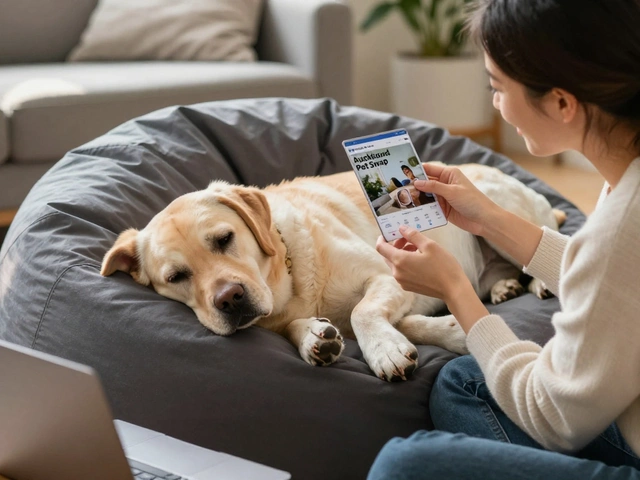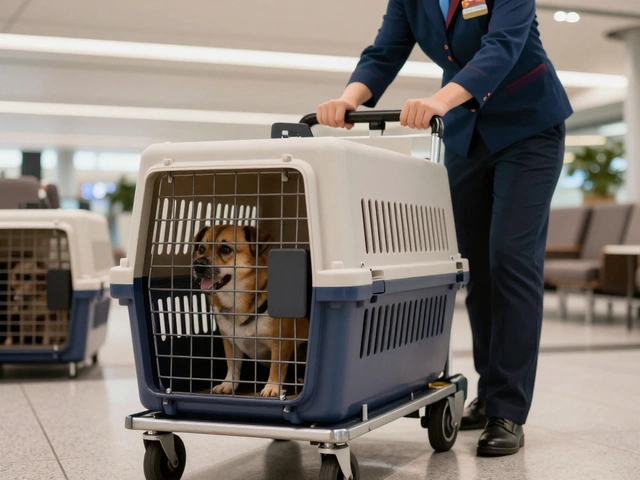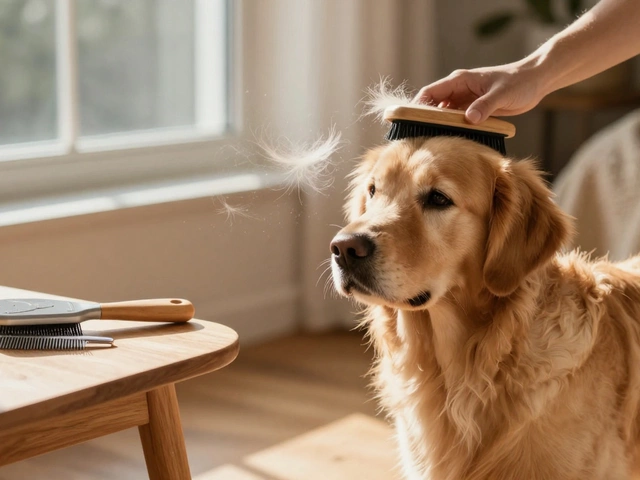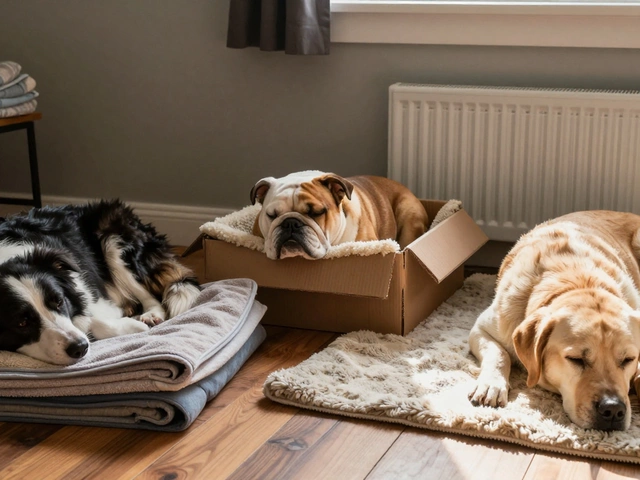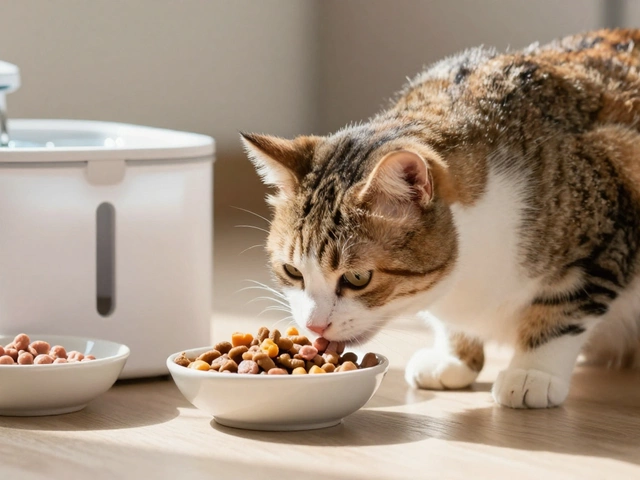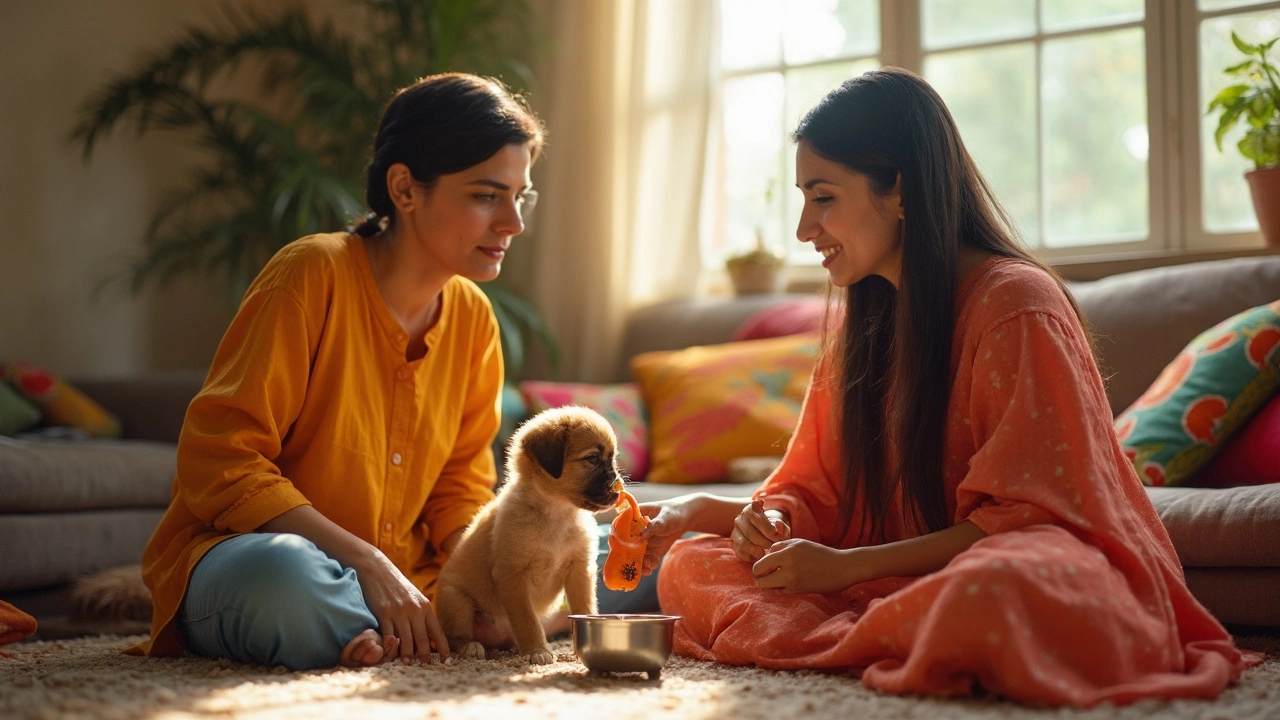
Ever look at your tiny puppy zooming around and wonder, “What should I even be doing with this little maniac?” You’re not alone. Eight weeks is prime time to start shaping their days, and a solid routine now makes life way less hectic for both you and your pup. At this age, puppies are basically furry sponges—soak up good habits and fun while you can.
First off, be ready: 8 week old puppies need almost as much sleep as a human baby—like 18 to 20 hours a day. Yep, you read that right. When they’re awake, it’s a wild mix of eating, playing, learning where to pee, and chewing…on everything. Since puppies love chewing, picking the right toys is a game changer. The best ones aren’t just to save your shoes—they help with teething and keep your pup’s brain busy. Try soft plushies with a squeaker, classic rubber toys, or even puppy-safe ropes. Rotate a few different toys each day so nothing gets boring.
Don’t stress if every day doesn’t go perfectly. The trick is to keep things predictable—same wakeup, meal, play, and potty times. Consistency works way better than perfection. With a few right toys and a bit of planning, you and your puppy will figure it out together.
- The Puppy Schedule: What Should a Typical Day Look Like?
- Feeding, Sleep, and Potty Breaks: Getting the Basics Right
- Why Play Matters: Choosing Toys That Help Puppies Learn
- Tips for Building Good Habits (and Staying Sane)
The Puppy Schedule: What Should a Typical Day Look Like?
Nailing down a daily routine for your 8 week old pup makes everything easier. Predictability helps them feel safe and helps you catch problems—like accidents—before they happen. Puppies this age have tiny bladders and a ton of curiosity, so mix structure with a little flexibility for those surprise zoomies.
Here’s what a typical day can look like. Think of it as a blueprint, not a rulebook:
- Wake up (usually around 6–7am): Quick potty break first thing—don’t wait. Puppies can’t "hold it" very long.
- Breakfast: Feed right after potty. Going out first means fewer accidents and helps build routine.
- Short play session: Break out a favorite chew toy or soft plush. This wakes them up and starts the day on a happy note.
- Nap time: Pups this young need to crash after every hour or so of activity. If they’re cranky or nipping more, they’re probably tired.
- Potty breaks: Every 1–2 hours during the day, and within 10–15 minutes after eating, drinking, or waking up.
- Midday meal: 8 week olds do best with three meals a day, spaced out morning, midday, and evening.
- Training/play: Keep it short—just a few minutes of "sit" or gentle leash time is plenty. Follow with a play session, then another nap.
- More naps and potty breaks: Basically, they’ll go back and forth like this all day.
- Dinner: Serve the last meal about two to three hours before bedtime to lower the risk of overnight accidents.
- Evening wind-down: Low-key play, cuddles, or a chew toy.
- Last potty break: Just before bed, every night. Even if it feels annoying, it saves you from middle-of-the-night cleanups.
Puppies need about 18–20 hours of sleep daily. If you’re thinking, “Are they really that sleepy?” check this out:
| Activity | Average Time Per Day |
|---|---|
| Sleeping | 18–20 hours |
| Eating | 30–60 minutes (across 3 meals) |
| Play/Training | 1–2 hours (broken into tiny sessions) |
| Potty Breaks | 10–12 times |
As for toys: Rotate them every day so each playtime feels fresh. Mixing up textures and types—like rubber chews, soft plush toys, and puppy-safe ropes—keeps your pup interested and less likely to nip at hands or shoes. Remember, building a predictable 8 week old puppy routine is one of the best things you can do for your sanity and your new best friend.
Feeding, Sleep, and Potty Breaks: Getting the Basics Right
Getting your puppy’s daily needs dialed in early makes everything else way easier. Start with feeding—8 week old puppies should eat three to four times a day, usually breakfast, lunch, and dinner, though some pups do better with a late-night snack. Stick to good quality puppy food that’s labeled for growth, and always measure out their portions since chubby puppies aren’t as cute once it’s affecting their health.
| Age | Meals/Day | Sleep Hours/Day | Potty Breaks (Avg) |
|---|---|---|---|
| 8 weeks | 3-4 | 18-20 | Every 1-2 hours |
Puppies this young have almost zero bladder control, so expect a lot of potty breaks. Here’s the golden rule: as many breaks as possible! A solid plan is every time your pup wakes up, after every meal, after playtime, and right before bed. If you’re curious how often that really is—plan on heading outside with your pup every 1-2 hours. Yes, it sounds like a lot, but it’s one of the fastest ways to prevent accidents. Always celebrate when they go outside—treats, happy voices, or favorite puppy toys work wonders.
Now let’s talk sleep. Dogs at this age crash hard. Let them nap whenever they flop down—forced activity just makes for a cranky, mouthy pup. Make a cozy, quiet spot your puppy can always return to for naps. Crate training can help here, since a crate gives them a safe base and helps with house training too.
- Feed three to four meals per day, spaced out evenly.
- Make a nap area that’s quiet and away from loud distractions.
- Take your pup out after every nap, meal, and play session—set a phone timer if you have to.
- If accidents happen, skip punishment. Just take them out right away and clean up quietly.
With a routine like this, you’re setting your puppy—and yourself—up for way less stress. You’ll be shocked at how much smoother everything goes once these basics fall into place.
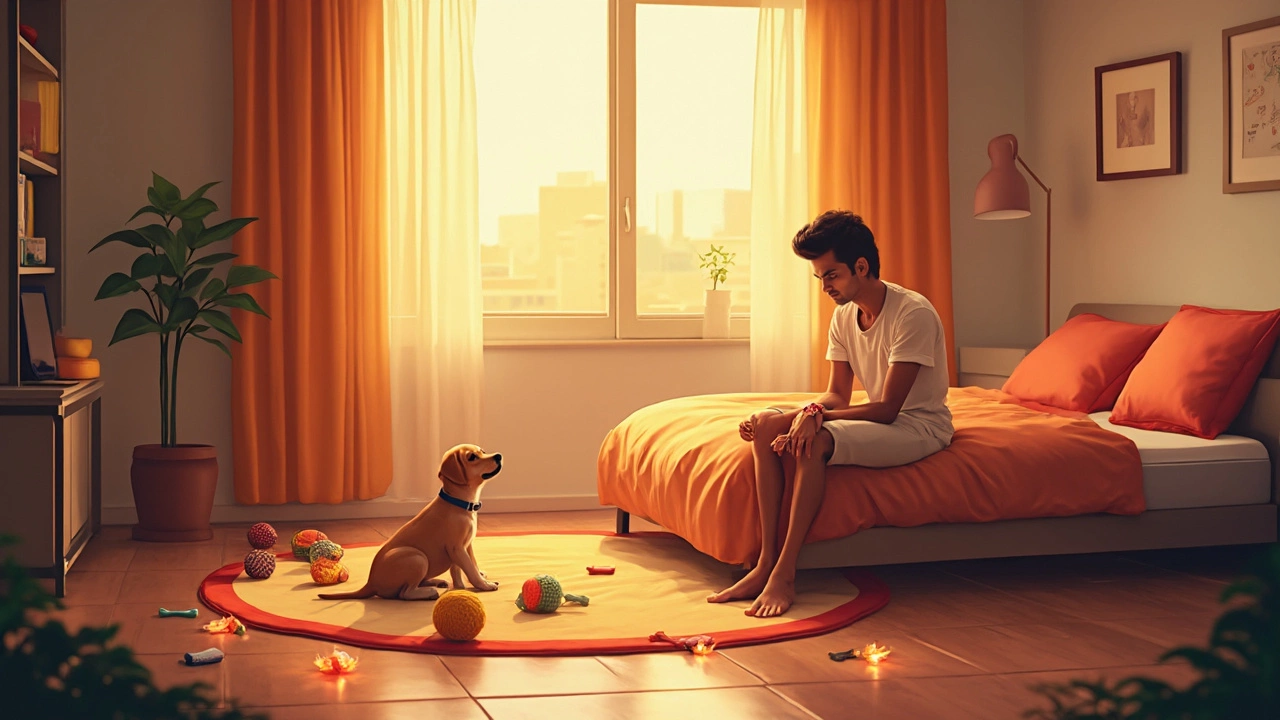
Why Play Matters: Choosing Toys That Help Puppies Learn
Play is more than just burning energy for puppies—it's basically how they figure out the world. When your pup chases a ball or tugs on a rope, they’re picking up all kinds of life skills. At 8 weeks, their brains are like little engines revving up, primed to learn everything from bite control to “what stuff is okay to chew.”
Look at what the American Kennel Club says:
"Play is critical for a puppy’s physical and mental development. Toys can help with teething, build confidence, and strengthen the bond between puppy and owner."
Choosing the right toys is about more than stopping your puppy from gnawing on your sneakers. The 8 week old puppy routine should include different toy types for different needs:
- Teething toys: Puppies at this age chew a ton. Soft rubber toys (like a classic Kong) or textured puppy toys can soothe sore gums.
- Interactive toys: Things like treat-dispensing balls or puzzle mats make your puppy think, not just zoom around. A simple treat ball can keep a pup busy for 20-30 minutes—a lifetime in puppy time.
- Plush toys with squeakers: Great for comfort and solo play. Make sure it’s made for puppies to avoid choking hazards.
- Tug toys: Short, gentle games of tug teach impulse control—remember you’re teaching “drop it” at the same time.
Here’s a quick look at why these toys matter at 8 weeks:
| Toy Type | Main Benefit | Pro Tip |
|---|---|---|
| Teething Toy | Soothes gums, reduces biting | Keep one in the fridge! |
| Interactive Toy | Builds problem-solving | Rotate them every few days |
| Plush/Squeaker | Comfort; reduces anxiety | Supervise for loose stuffing |
| Tug Toy | Teaches gentle play | End game before pup gets too wild |
If you see your puppy lose interest, switch it up. Rotating toys actually makes old toys feel new again (yep, puppies are that easy to trick). And always check toys for damage so there aren’t any surprises.
Bottom line: having the right toys isn’t spoiling your puppy, it’s helping them grow up smart—and saving your favorite socks in the process.
Tips for Building Good Habits (and Staying Sane)
Starting good habits with your 8 week old puppy is honestly about keeping things simple and steady. Puppies grow fast, and what feels pointless now (like those endless potty trips) is building patterns that will stick for years. Here’s how to get it done without losing your mind.
- 8 week old puppy routine: Stick to a routine for everything. Wake up at the same time every day, then hit potty, feed, play, and rest in the same order. Most puppies can only hold their bladder for about one hour per month of age, so that’s just two hours tops at this stage.
- Prevention is easier than fixing a bad habit later. If your pup starts chewing cords, swap them for a puppy-safe toy right away. It’s faster than un-teaching a habit down the road.
- Keep things positive. Puppies respond best to rewards—tiny treats or excited praise when they do something right. If they mess up, just redirect. No yelling or scolding—pups learn best when you focus on catching them doing good things.
- Rotate two or three different toys daily. It tricks your puppy into thinking every day is Christmas and helps you figure out what toys keep them busy the longest.
- Mark the tiny wins. Celebrate when your puppy goes potty in the right spot, chills quietly in the crate, or bites a toy instead of your shoe.
Keeping up energy for all this takes a toll. Give yourself breaks, even if that means popping your pup in their crate with a chew toy so you can regroup. It’s not just for them—you need a sec to recharge too.
| Good Habit | How to Build It | What to Avoid |
|---|---|---|
| Potty training | Take outside every 2 hours, praise immediately | Letting puppy roam unsupervised indoors |
| Chewing (on toys, not furniture) | Always offer toy replacements, rotate options | Yelling or scolding after the fact |
| Calm crate time | Crate for short, positive periods with treats/toys | Using crate as punishment |
| Gentle play | Low-key play session, teach "gentle" with treats | Roughhousing with hands |
Fact: Research from reputable trainers shows puppies create lifetime habits by 16 weeks—halfway through your first four months. A little patience now pays off big time later. And remember: It’s normal to feel overwhelmed some days. Every puppy parent does.

